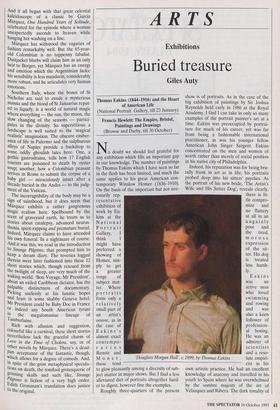Every third thought is his grave
Ian Thomson
STRANGE PILGRIMS by Gabriel Garcia Marquez Cape, £14.99, pp. 188 It must be the most lively burial place in all Europe, the subterranean golgotha built by Capuchin friars in the Sicilian capital of Palermo. Eight thousand mummified humans are segregated according to their former professions, priests among the best preserved. Apparently most of these inglorious corpses were fitted with glass eyes until American soldiers filched them for souvenirs during the last war. Gabriel Garcia Marquez would like this legend. In fact one of his short stories in Strange Pilgrims alludes to the Sicilian necropolis.
There are 12 new stories in all, several set in southern Italy. For the first time, according to his publishers, Marquez 'has transported his magical realistic sensibili- ties out of Latin America'. Every time I hear those words — 'magical realistic' — I want to reach for a revolver. Great Britain in the mid 1970s was flooded with phantas- magoric novels by Colombians or Cubans with names like Castaneda, Carpentier and Cortazar. Many were of indifferent quality. And it all began with that great celestial kaleidoscope of a classic by Garcia Marquez, One Hundred Years of Solitude, celebrated for the episode where a woman unexpectedly ascends to heaven while hanging her washing on a line. Marquez has withstood the vagaries of fashion remarkably well. But the 65-year- old Colombian is no tuppenny fabulist. Dustjacket blurbs will claim him as an only heir to Borges, yet Marquez has an energy and emotion which the Argentinian lacks: his sensibility is less mandarin, considerably more robust, and he articulates very human emotions.
Southern Italy, where the bones of St Nicholas are said to exude a mysterious manna and the blood of St Januarius reput- ed to liquefy, is a world of natural magic where everything — the sun, the moon, the slow changing of the seasons — partici- pates in the divinity. So superstitious a landscape is well suited to the 'magical realistic' imagination. The obscure exuber- ance of life in Palermo and the sulphurous alleys of Naples provide a backdrop to some oddly ghoulish tales here. One, a gothic gastrodrama, tells how 17 English tourists are poisoned to death by oyster soup; another, how a Colombian peasant arrives in Rome to submit the corpse of a baby girl — miraculously intact after a decade buried in the Andes — to the judg- ment of the Vatican.
The incorruptibility of the body may be a sign of sainthood, but it does seem that Marquez exhibits a rather gangrenous magic realism here. Spellbound by the scent of graveyard earth, he treats us to stories about catalepsy, advanced neuras- thenia, spirit-rapping and premature burial. Indeed, Marquez claims to have attended his own funeral. In a nightmare of course. And it was this, we read in the introduction to Strange Pilgrims, that prompted him to keep a dream diary. The reveries logged therein were later fashioned into these 12 short stories which, though rescued from the twilight of sleep, are very much of the waking world. 'Bon Voyage, Mr President', about an exiled Caribbean dictator, has the Palpable distinctness of documentary. Picking uselessly at his lunatic hopes and fears in some shabby Geneva hotel, Mr President could be Baby Doc in France or indeed any South American tyrant in the megalomaniac lineage of Tarnburlaine.
Rich with allusion and suggestion, Colourful like a carnival, these short stories nevertheless lack the graceful charm of Love in the Time of Cholera, say, or of other novels by Marquez. There's a dead- pan acceptance of the fantastic, though, which allows for a degree of comedy. And, in spite of the grim metaphysical specula- tions on death, the tomfool grotesquerie of grinning skulls and such like, Strange Pilgrims is fiction of a very high order. Edith Grossman's translation does justice to the original.



























































 Previous page
Previous page